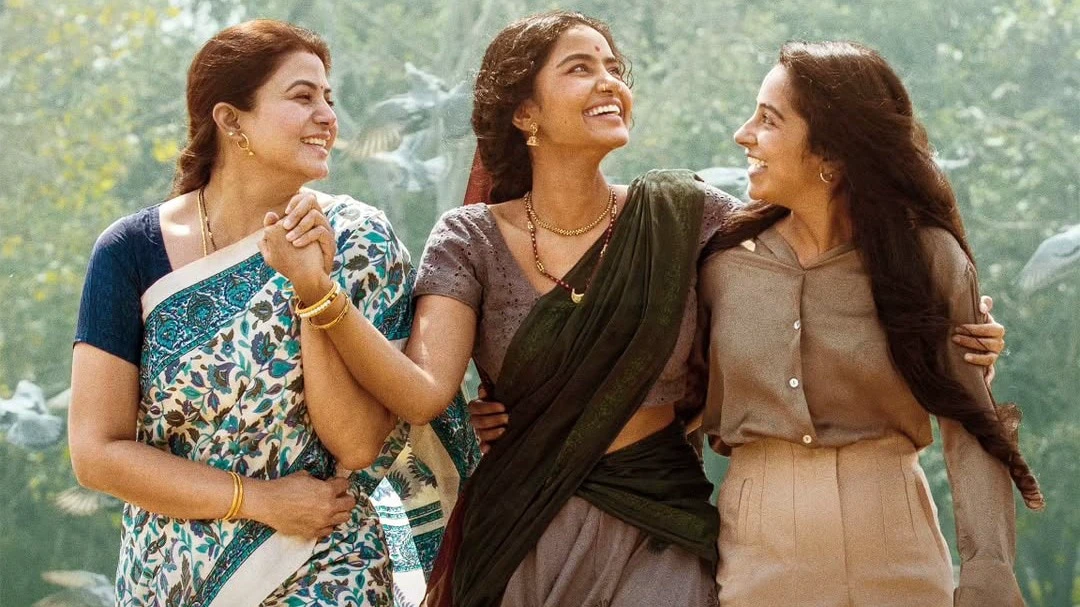Women-led films don’t always have to be about a woman being belittled by everyone around her, only to later rise as someone who rides bikes in the Himalayas.
A women-led film can also be about learning and unlearning – discovering that the world beyond their cocoon presents opportunities. How to make use of this vast world of opportunities is up to each individual. But the important underlying message is that they have a choice. A choice that lets them spread their wings and fly, or simply feel the freedom of having options. That is what director Praveen Kandregula’s ‘Paradha’ is all about.
Subbu (Anupama Parameswaran) belongs to the fictional village named Padathi, where women, who have hit puberty, have to wear a veil till they die. This superstitious belief is told to the villagers as the story and curse of the deity, Jwalamma. If the paradha (veil) is taken off, wilfully or unintentionally, the woman has to face death. Hold on! A ritual followed by death.
A strong wind blows away Subbu’s paradha. At that moment, she is shocked but quickly gathers composure and wears it before anyone sees. Yet, this minor conflict soon follows her, threatening her potential wedding and her life. However, Subbu receives a period of grace – again due to gusty winds – giving her time to prove her innocence. Will Subbu prove her innocence and escape from death? What happened to her lover? All these questions and more are answered during the film’s approximately two-and-a-half-hour runtime.
Director Praveen Kandregula’s ‘Paradha’, which he co-writes with Poojitha Sreekanti and Prahaas Boppudi, grabs your attention from the very first frame. We are transported to the world of Padathi, where women take pride in wearing colourful and designer paradhas, clothing that restricts them in more ways than one. Women in Padathi fear for life over a flimsy piece of clothing. Their lives are tied to paradhas, clothing that they wear for protection, as Subbu’s mother tells her. But does it really?
Subbu learns this the hard way when the village fails her collectively. They refuse to believe her legitimate reasons. Subbu is not just a naive village woman, she also has that silent resilience, which doesn’t allow her to apologise for a mistake she didn’t commit. And when the story makes her meet two women, Rathna (Sangeetha Krish) and Amishta aka Ami (Darshana Rajendran), Subbu, unshaken by the customs that clip her wings, unlearns years of conditioning to see the world without the veil of patriarchy.
While Rathna is a housewife with an over-dependent husband and children, Ami is a ‘woke’ feminist striving hard as a civil engineer in a male-dominated industry. Rathna yearns for a break from her caregiving duties. Ami, on the other hand, waits for that much-needed promotion at work. She is also a person who thinks a strong woman doesn’t like pampering her husband, loves shopping, and makeup. A conversation with a female officer makes her understand how women inadvertently judge another woman just for living her life.
Subbu, Rathna, and Ami are on a journey of self-discovery, and the strong sisterhood helps them understand their limitations. And in each other’s company, they find freedom. There’s always something about women’s friendships that gives room for each other to uplift one another while lending an ear to their struggles. Take, for example, the scene where Subbu breaks down, asking what wrong she did to be faced with such punishment. Ami cries with her, but also tells her to question the superstitious beliefs that are fed to her. Rathna rejigs her memory and rationally asks her how a village deity, who is a warrior herself, can box all the women in the village. Without a tirade against men, the film honestly presents a story that makes women believe that there is a world beyond the stories that does not favour women or their freedom.
There are several such moments in ‘Paradha’ that challenge your understanding of women and expose the judgments made in the name of empowerment. That said, with a total runtime of around 2 hours and 20 minutes, the film could omit certain sequences – especially those during the Dharamshala portions – to be more effective.
Anupama Parameswaran, Rathna, and Ami represent women from three different stages and upbringings. How they continue to be chained to their beliefs proves that we (women) still have a long way to go, and growth is never permanent. Anupama, as Subbu, brings her best in a role that captures the trials and tribulations she goes through. Darshana Rajendran as Ami represents a city-bred woman who wears her emotions on her sleeve. Sangeetha, as Rathna, represents our mothers, who are primary caregivers at home. The scene where she gives it back to her husband and the funny phone call with him prove her prowess.
The men in the world of ‘Paradha’, be it Subbu’s father or her lover Rajesh (an effective Rag Mayur), or Rathna’s husband (Harsha Vardhan), showcase characters who inflict their archaic practices on the women of their houses.
‘Paradha’ is a non-preachy film that tells women to look beyond their limitations and feel the wind on their faces.
